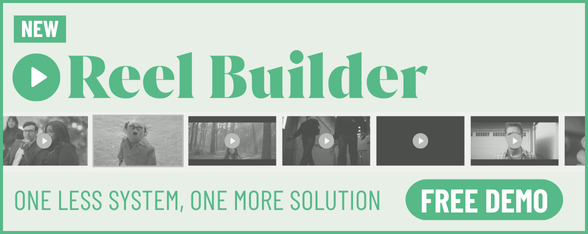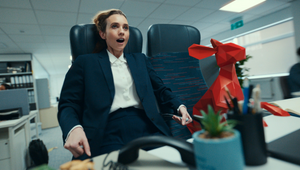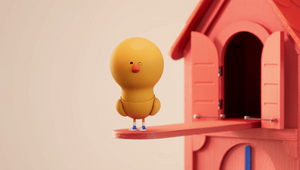
How Factory Fifteen Transports Us to Extraordinary New Worlds

Directors and creative studio Factory Fifteen have just undergone a huge makeover, changing their entire brand identity. Which makes now a perfect time for you to really get to know them. A new logo, website, showreel and self-designed new studio crystallises what the company is all about. And we know everyone says this, but it’s not like other studios.
Factory Fifteen's work spans architectural visualisation, branded content and film and TV. They have always done things a little differently. Founded in 2011 by Kibwe Tavares, Jonathan Gales and Paul Nicholls, its name was inspired by the class they attended at The Bartlett UCL, called ‘Unit 15’, taught by renowned educator and thinker Nic Clear and architectural photographer Simon Kennedy. Soon the studio’s thought-provoking, political and technological films broke the mould in architecture and won numerous awards, such as the RIBA Silver Medal, several CG Architectural 3D Awards and selection to dozens of international festivals, including Sundance and the Vimeo Awards Festival.

Above: Factory Fifteen's co-founders in 2011

Above: Factory Fifteen's co-founders in 2021
The collective was founded shortly after Jonathan, Kibwe, and Paul graduated from their master’s programme in architecture, setting up as a studio in an artist’s residence in Brixton. “Our bond was based on our desire to use architecture as a means of storytelling,” says co-founder and chief creative officer Paul. “So much of our world and lives are shaped by our physical surroundings, and we were fascinated by the stories they tell. Whether social, political, cultural, or technological, our cities tell stories of where we have been and where we are going. We expressed this through short films, which caught the attention of advertisers, architects, and film producers, forming the three pillars of work that define us today.”
Jonathan, Kibwe and Paul’s graduation films, ‘Megalomania’, ‘Robots Of Brixton’, and ‘The Golden Age: Somewhere’, were the initial catalysts for generating interest in the trio and ultimately being commissioned for the studio’s first major short film, ‘Jonah’. Directed by Kibwe, it was Sundance-nominated, propelling him towards directing feature films. “Jonah will always hold a special place in all our hearts being so transformative for everyone involved,” says Paul. Other notable shorts from those early years include the music video for ‘The Bug’ and the sci-fi short ‘Ana’ for the History Channel.
As a result of that groundwork (and much more besides), Kibwe currently has two films in development: ‘The Kitchen’, written by Daniel Kaluuya, and ‘Prince Of Port Au Prince’, an animated fantasy story about Wyclef Jean’s life growing up in Haiti. Expected to release in 2025, Paul did three months of worldbuilding with a small internal team for Netflix and Kibwe last year. “The work we’re making for that I think is among my best I’ve helped art direct. So watch this space for that one,” says Paul.
Over the years, Factory Fifteen’s interest in space and media has evolved into immersive work for clients such as Woolmark, for whom they created a large-scale interactive threshold into an animated fashion show. Describing it as “one of the personal favourite worlds I’ve built,” Paul explains, “it was so big and tangible, and also so simple in concept. I’m also a sucker for abstraction.”
They’ve also created an immersive experience to the North Pole for children with cancer for Kia, as well as designed a 4D racetrack for Nissan's Formula E brand. “All have helped define our current path,” says Paul.
“We definitely entered the advertising industry through the side window.” Represented by Nexus Studios, their commercial work is some of the most exciting out there, but the directors don’t feel fully part of the advertising community. “We were, and somewhat still are, considered the weird architects that talk about 'space' within the advertising industry,” says Paul. “However, we play up to that because it's true and it's our unique selling point. Over time, our ‘pitch’ has become easier with more examples of environmental storytelling for brands under our belt. The Tokyo Olympics spot for the BBC was the perfect example, and it's what we are now known mostly for. We applied that methodology to its fullest, with great effect.” Winning awards from BAFTA to British Arrows, it became the studio’s calling card for the advertising industry.
The new Factory Fifteen website is a feast for the eyes, as you would expect, and full of animation. It also reflects their new ethos: instead of ‘projects’ or ‘work’, the team "design and build hyper-detailed, cinematic WORLDS and tell stories within them”.
Through the years, the studio has opened its own art and events gallery, established a co-working space, organised large-scale exhibitions and music events, conducted teaching workshops, and “generally aimed to have the most fun possible with our friends and clients, whom we love,” says Paul, many of whom are outside of advertising. And when it comes to non-branded work, “we use the same methodology in pitching and discussing our ideas as we do for brands,” says Paul. “This approach has helped elevate our work for architects and film producers, resulting in a cross-pollinating relationship between our client types. It used to feel a little separate, justifying one to the other, but now it all feels quite homogenous in terms of our approach, yet satisfyingly varied in terms of output.”
As the focus on ‘worlds’ suggests, Factory Fifteen is still deeply rooted in building spaces. “Architecture is the mother of all design courses you can study,” asserts Paul. “No other design based course makes you think about so many different things at once at so many scales. It inherently makes you a bit of a nut for detail so this, along with a general interest in films with a bias towards worldbuilding or environmental storytelling like space ‘2001’, ‘Minority Report’, ‘High Rise’, or my personal fave ‘Eternal Sunshine Of The Spotless Mind’, has spawned our way of seeing and working we enjoy. It’s not the most mentally sustainable way of working as it does force a certain obsessive mentality of trying to solve things nobody asked for.”
At the forefront of the launch comes a new logo, a mark, a symbol, a metaphor, and a bold play on FF, unique in adapting to its setting. It’s much more than a superficial repackaging for the studio though. With the tragic loss of Factory Fifteen co-founder Jonathan Gales in November 2022, this pivot comes at a poignant time. “In November, Jonathan Gales, was tragically killed by a drunk driver in LA. We deeply miss our friend and colleague as we enter the next phase of the studio without him,” says Paul. “However, his memory lives on through his family and at the core of our DNA.
“The loss of Jono still feels raw and intangible. What happened to him was both brutal and unfair. I have given up on the idea of trying to replace him because he was uniquely talented in many ways. Instead, I am focusing on honouring his interests by taking on work that aligns with them. Even though my own interests may differ from his at times, it feels right to continue pursuing the type of work that Jono was passionate about. This work remains at the core of our DNA and we will continue to push ourselves as far as possible in that direction.”
The rebranding of their organisation was a topic that Jonathan and Paul discussed extensively over the years. “After his funeral, I made it my main focus to find a way to resolve this matter, both in his honour and as a way of moving forward without him. We already had an established brand aesthetic that I didn't want to fundamentally change, but the logo and even the name were up for debate at one point.
“In 2011, when we were founded, logos were no longer relevant and it was all about the typeface. However, in 2023, having a meaningful mark felt right. We wanted something that was brutalist, minimalistic, and memorable. We also wanted something that represented the malleable nature of our approach in fitting within the different sectors we work in while maintaining a clear identity and approach. This led to a changeable logo depending on where it is seen, which feels meaningful to us and not gimmicky. We would like to thank Rabbithole, our branding agency, for collaborating with us over the past five months.”
To accompany their new digital home, the team also has a new studio in South London with a self-designed, purpose-built interior. A chic black box houses the technical infrastructure, while the outer ring provides closable meeting spaces, a kitchen, ample social areas, and the main workspace.
12 years on, the studio’s output demonstrates a staggering array of spaces they’ve built. While the people they work with vary, their vision is unified across these industries with their new slogan: “Transporting Audiences to Extraordinary New Worlds”
Defining a motto or slogan that summed up Factory Fifteen’s offering to relate to their different client bases was a challenge. “Easily the hardest part of our rebrand and something we worked with Rabithole first on,” says Paul. “So important was this decision that if we couldn't crack it we were prepared to split the directing side of the company from the production side for marketing purposes. Luckily we landed on something I’m really happy with that can resonate with architects and brands alike.
“I love the word ‘transporting’. It's a really physical word. It makes you think of being taken on a journey, of being immersed in an image or film or experience. You are taken somewhere else, for a moment.
“We don’t visualise normal places, we are not documentary film makers, we visualise some of the most amazing future buildings in the world, like the recently released MSG Sphere, or Zaha Hadid’s Beeah building. We design and create ‘Extraordinary New Worlds’ for all our clients, which is why it fits so well as the defining elevator pitch of what we do, which has always somewhat eluded a simple answer from any of us until now.”















